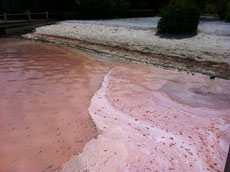The government has confirmed that no specific agreement has been signed with Sri Lanka allowing Sri Lankan fishing vessels to cross Maldivian waters enroute to the Arabian Sea.
Maldivian Foreign Minister Ahmed Naseem said yesterday that the only development of note with Sri Lanka’s External Minister was the release of seven fishing vessels detained by the Maldives on suspicion of illegal fishing.
The confusion was sparked after an article published on August 5 in Sri Lanka’s Daily Mirror referred to a statement from the country’s External Minister Neomal Perera, claiming such an agreement existed so long as vessels gave 48 hours notice to the Ministry of External Affairs in Sri Lanka or the High Commission in the Maldives.
“[Local newspaper] Haveeru went to town when Fisheries Minister [Dr Ibrahim Didi] said no such agreement had been signed with Sri Lanka,” President Mohamed Nasheed’s Press Secretary Mohamed Zuhair told Minivan News today.
“The opposition seized it as an opportunity to whip up confusion and say the government had compromised the sovereignty of the Maldives – their latest favourite red herring.”
Zuhair said that on being informed by Haveeru that Sri Lankan’s External Minister had made such a statement, he had told the journalist that Sri Lankan fishing vessels – or the vessels of any nation – were already entitled to cross Maldivian waters as the Maldives was party to the UN Convention on the Law of the Sea (UNCLOS).
“The Maldives became party to it in 1982, became a signatory in 1994, and ratified it in 2000. It provides for ‘innocent passage’, and in the case of a fishing vessel requires that such gear be stowed,” Zuhair explained.
Article 17 of the convention states that “ships of all States, whether coastal or land-locked, enjoy the right of innocent passage through the territorial sea”, while Article 24 further states that a state “shall not hamper the innocent passage of foreign ships through the territorial sea except in accordance with this Convention.”
‘Passage’ precludes activities such as research surveys, military exercises, “serious” pollution and fishing.
“This may have been taken from an erroneous observation from the Minister during his visit,” Zuhair said, “but the Daily Mirror story is broadly correct, and I told Haveeru that this was permission [Sri Lanka] continued to have. The embassy needs a system where authorities can ID the vessel [to combat illegal fishing].”
The Ministry of Fisheries and Agriculture issued a statement yesterday strongly denying that the reported maritime agreement with Sri Lanka had been signed by the government.
While discussions about allowing passage for Sri Lankan fishing vessels through Maldivian waters had taken place on numerous occasions, “the Maldives has always said that foreign vessels could cross Maldivian seas only in accordance with Maldivian law.”
The press release explains that “innocent passage” was routinely granted for foreign vessels as the Maldives is signatory to the UN Convention on Law of the Sea but foreign fishing vessels without a license to operate in Maldivian waters are required to seek the ministry’s authorisation before entering the Maldives’ economic zone.
Moreover, the Ministry of Defence and National Security must be consulted before authorising passage for such vessels and the Fisheries Act “empowers the ministry to require monitoring systems in the vessels to locate its position through satellite.”
Parliament spent several hours yesterday debating the non-existent agreement with Sri Lanka, which led to a rare split in MDP ranks after MP Mohamed Musthafa vowed to submit a binding resolution demanding the government recall the ‘decision’ as “[Sri Lanka’s] intention is to steal our fish. I cannot just stand aside and watch while they take away our fish, which is the only source of natural resource we have in abundance. It is a right that has to be preserved for future generations.”
The issue quickly fell victim to the Maldives’ highly partisan politics, after head of the opposition Dhivehi Rayyithunge Party (DRP)’s fishing branch, Ali Solih, denounced the supposed agreement as “an insult to Maldivian fisherman” and “a dangerous deal,” as the Maldives did not have the capacity to monitor illegal fishing.
DRP MP Ali Saleem then proposed a motion without notice yesterday demanding that parliament “look into what is hidden behind this. Did you know that even if Sri Lankan fishing vessels traveling to the Arabian sea are carrying sharks or fish catch, there is no way to know because of this agreement signed yesterday?”
MDP Chairperson ‘Reeko’ Moosa hit out at the opposition for labelling Sri Lanka as “thieves” in the pursuit of local political gain, and claimed the allegation was “very irresponsible”.
MDP MP ‘Colonel’ Mohamed Nasheed suggested during yesterday’s impromptu debate that “it would be better for us to find out accurate information on the matter”.
The Sri Lankan High Commission had not responded to Minivan News at time of press.
Likes (0)Dislikes
(0)Dislikes (0)
(0) 